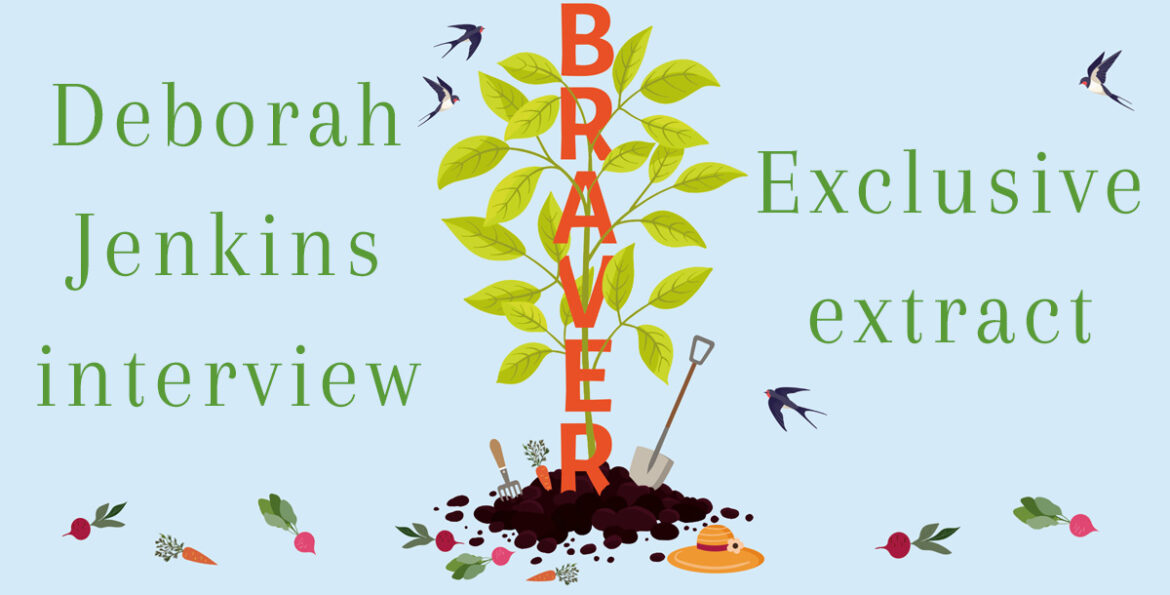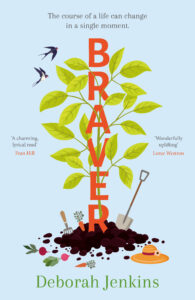

Deborah Jenkins interview and exclusive extract
- 28th June 2022
- Category : Author,Blog,Interviews & Blogs
Deborah Jenkins is the author of Braver, an uplifting story about community and kindness, publishing on 30 June 2022. Struggling with OCD and anxiety, Hazel isolates herself from others and sticks to rigid routines in order to cope with everyday life. But when she forms an unlikely friendship with Virginia, a church minister, she begins to venture outside her comfort zone. Read this interview with Deborah Jenkins to find out more, and to see an exclusive sneak peek of Braver.

How did you start writing and what does writing mean to you?
I’ve written on and off since I was a child, but started writing seriously in my thirties when my youngest started school. I wrote some short stories but didn’t know if they were any good, so I paid to have them assessed by a writing agency. The lady said she really liked them, and, in her opinion, I would be able to write a novel. Shortly after that, I had one of the stories accepted for publication, so I took up her challenge and started a novel.
Writing is a kind of lifeblood for me. I think it’s how I process the world. Once or twice, after rejections from agents or publishers, I’ve tried to not-write, but it didn’t last. It made me unhappy.
Did you always want to be a writer?
Yes. Ever since the age of eight or nine, I’ve wanted to publish a ‘chapter book’. I was an avid reader, a lonely, awkward child and books were my friends. In the stories I read, I discovered others who also felt ‘out of place’ somehow. I began to write my own stories and teachers seemed to like them, so I decided that’s what I wanted to do.
If you could describe Braver in one word, what would it be?
Hopeful
Was there a particular part of the story that you found difficult to write?
Some of the scenes with Harry and his mum were quite emotional for me to write.
What inspired you to write Braver?
I wanted to write the kind of book I enjoy reading, with quirky characters, twists and turns, and a positive vibe. I love books about community, where people gain strength and courage from a sense of belonging somewhere. As I’ve been involved with church communities all my life, that seemed the best setting to choose for Braver. I also love that friendship, often elusive and surprising, can be found in unexpected places. I was inspired by this too.
Braver is written from the perspectives of Hazel, Virginia and Harry. Why did you choose to tell the story through these characters, and did you have a favourite character to write?
Well, I wanted to write the story through the voices of three characters because I love books where the same events are viewed from different perspectives.
Hazel came to me almost fully formed. In my mind, I saw her hovering at the door of a busy staffroom, willing herself to go in. I knew she suffered with her mental health and was anxious and lonely.
Then I decided I wanted an older woman to befriend her, someone warm and inclusive, who had learned the craft of caring by surviving her own pain. Virginia was a joy to write because she is the kind of older woman I aspire to be − caring, generous, kind.
Harry was trickier, being male, young and vulnerable. But as a teacher and mother of a once-teenage boy, I was sadly familiar with situations of need and neglect where children are involved. Harry is probably a combination of many of these.
I thought Hazel would be my favourite, but I think I love them all equally. It’s extraordinary how real they are to me. I sometimes dream about them.
What’s your favourite book and who is your favourite author?
There are so many, and they change all the time! My current favourite is All my Mothers, by Joanna Glen. She is a favourite author because she explores the fragile nature of friendship and community so beautifully. I also love Maggie O’Farrell, Rachel Joyce, Libby Page and Frederik Backman. I was over the moon when someone recently said my writing reminds her of his.
Do you have a writer’s habit that helps you ‘get in the zone’?
There is a nature reserve near our house with trees, a lake, birdsong. A walk over there in dappled light is magical and really helps me to ‘get in the zone’. Ideas drop into my head like stones.
Do you have a writing schedule?
Yes, I write in the morning and start by editing yesterday’s work until I think it’s the best it can be. Then I move on. This seems to go against all the writing advice I’ve ever read but it works for me!
Where do you tend to write?
In our current house, I’m blessed to have a study with a window overlooking woods. It feels like a huge luxury after years typing in a corner of the bedroom.
What do you hope people take away from reading your book?
That local community groups are great places to find friendship, support and a sense of belonging.
What’s a piece of advice you can give to aspiring authors?
Never give up. It took me fifty-two years. If you keep writing, learning from others, and are determined to improve whatever the cost, it’s just a matter of time…
*
Keep reading for a sneak peek of Braver…
There’s a curious symmetry to the rhythm of suburban mornings: birds, the smell of bins, Bruno and his dog Trevor from number 10 shuffling along the pavement (surely their names should be the other way round?). And always, in the background, the irregular pulse of trains carrying hopefuls to the city to sit under fluorescent lights, making money to buy dreams. Hazel thinks all this while she waits at the railway crossing for the red-and-white arms to rise and point out the sky, as if to remind her there is more. The back of the waiting train is so close, she could reach out and touch it. It is early and the 6.21 from Oldbridge is swallowing only a few businessmen. Mainly women in sensible shoes (cleaners?) and men in overalls. Hazel breathes in the March morning with its smell of tarmac and cherry blossom. She wishes she could stand here forever with her thoughts instead of facing the day.
The doors of the waiting train hum and close as the line of carriages jerks to life. Once it has passed, the crossing arms wobble to life and begin to rise. The people either side of Hazel – young mum with baby, man in yellow tabard – duck under the rising barriers and make their way across the railway line. The woman’s ponytail has an efficient swing to chime with her stride. Hazel hesitates, looks both ways, makes sure the train is moving away from her, then counts the steps she takes to reach the other side. It should be ten. She is obliged to make an extra-large one to avoid it being eleven.
With careful steps, she walks along the side of Waitrose and waits on the kerb for a good time to cross. This can be tricky as it’s better if there are distant cars or no cars on both sides to give a sense of balance (it can be busier at six-thirty in the morning than you’d think). Today there is nothing in sight and Hazel crosses, taking care to step over the white line in the middle so that her feet land with equidistant thuds on the other side.
She turns the corner into Newbarn Road and sees the young mum ahead of her. If your body acts with confidence, your feelings will follow. That’s what Moira, the counsellor, had said. Hazel stands up straight and tries to imitate the woman’s buoyant stride. The pavement narrows as she navigates the postbox. She brushes against it, smearing her jacket with dirt and dew. Horrified, she stops to examine her arm. The pale sleeve is grubby, daubed with damp and the remains of a cobweb. Number 10. Above all, breathe! (She reads the list of Coping Strategies every morning and can see the exclamation mark in her head.)
She is almost at the corner of Broom Hill. She breathes and looks up. And this is when she sees the woman, standing on the corner. She is so striking – tall and broad, somehow imposing, filling the space on the pavement as if she owns it – that Hazel forgets about her sleeve and stares. What on earth is this woman doing just standing there at six-thirty in the morning? Hazel creeps along the pavement and looks both ways three times, preparing to cross, even though she knows a side road like this will be free of traffic at this time of day. The woman sees her.
‘Good morning!’ she calls. Her voice, although quiet, is deep and projects across the road to where Hazel is standing. It holds the hint of a chuckle. ‘You’re up early!’
*
Braver is publishing 30 June 2022. Pre-order now from Blackwell’s and Waterstones.














